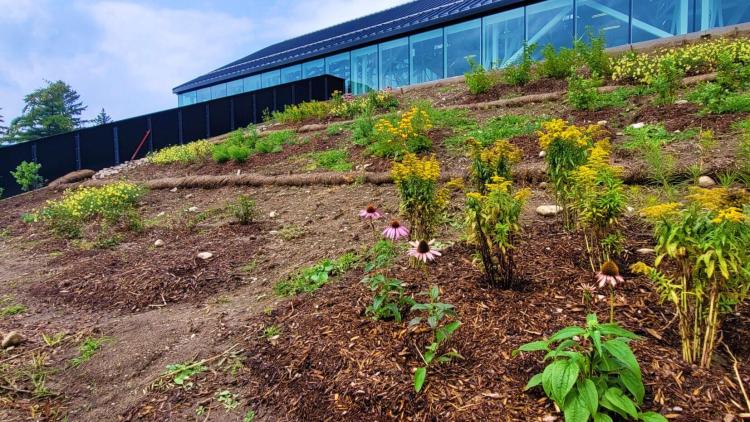Pollinator gardens are popping up at Conestoga to create natural spaces and support the college's sustainability efforts.

Pollinator gardens are being created on Conestoga campuses with native and drought-tolerant plant species.
The gardens are planted with native and drought-tolerant species that require little tending and attract pollinators - tiny but essential creatures for a healthy ecosystem and agriculture. And they're already flocking to the natural spaces.
At the Kitchener - Doon campus, the grassy slopes outside the recreation centre were transformed from manicured lawns to more naturalized areas that are already attracting bees and other species that spread pollen from plant to plant while busily gathering food.
"If you visit them on a nice, sunny day, it is buzzing. A wide variety of pollinator species are already making use of it. It is really wonderful," said Samantha Tremmel Lamb, environmental sustainability and energy performance manager.
The gardens are part of a landscaping master plan to bring more natural spaces to Conestoga campuses.
They're a good fit at the Cambridge - Fountain Street campus, which holds a Leadership in Energy and Environmental Design (LEED) Silver accreditation for its energy-efficient design and infrastructure, including sustainable features such as a solar field and geothermal heating and cooling system.
The pollinator gardens also incorporate an innovative green feature - permeable pavement that allows rain to pass through the surface to bring water to the vegetation and for stormwater management.
Work is still underway on adding to the Fountain Street gardens. More seating will be added - an especially nice addition for those waiting for a bus at the nearby stop. Other projects are being explored, including urban agriculture, such as beehives.
Bees, bats, beetles, birds, butterflies, flies, moths and wasps are all pollinators, and vital to crop production and in creating and preserving biodiversity. The gardens also provide a place for the pollinators to live and nest, as well as shelter over the harsh winter months.
Educational signage is coming for garden visitors to learn more about the species and habitat. The advantage of native, drought-tolerant species is they require minimal water and maintenance to thrive without pesticides.
However, the gardens aren't solely to nurture pollinators and preserve native habitats, but also to bolster the well-being of students and staff who can immerse themselves in nature and enjoy a quiet moment.
"I love that it allows students and staff to reconnect with nature in an urban environment and learn more about our local ecosystems, the local species that are abundant in this area," Tremmel Lamb said.
Conestoga is developing a sustainability action plan that aims to position the college as a leader in campus sustainability. The comprehensive plan will outline strategies to infuse sustainability principles into academic programs, research endeavours, operational procedures and governance.











